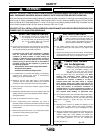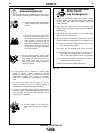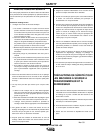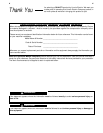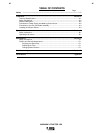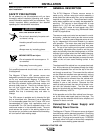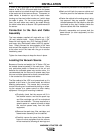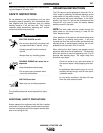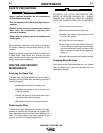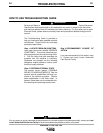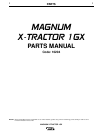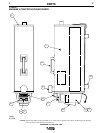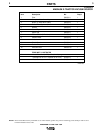
A-3
INSTALLATION
MAGNUM X-TRACTOR 1GX
A-3
In order to take advantage of the automatic stop/start
feature of the K173-2, the work cable from the power
source needs to be routed through the sensor located
at the motor end of the vacuum source. This sensor, or
cable holder, is located on top of the plastic motor
housing and has two bristle brushes on it which keep
the cable in place. For low current welding applica-
tions, the work cable may need to be routed through
the cable holder twice to assure 100% performance of
the sensor.
Connection to the Gun and Cable
Assembly
The hose adapter supplied will mate with any 1-3/4”
(45 mm) exhaust hose. Lincoln Electric has 1-3/4”
hoses for both regular duty (PVC flexhose S19947- )
and heavy duty (Reinforced rubber 14927-8) applica-
tions. Simply connect the hose adapter to the hose
and connect the adapter to the K173-2. Do the same
at the other end of the hose with the gun or suction
head being used.
Tighten the hose clamps to keep the hose in place.
Locating the Vacuum Source
Because of its size and weight, the X-Tractor 1GX can
be located almost anywhere in the work area. Since
only particulate matter is filtered out of the air and
because the unfiltered gases may contain odors, it is
recommended that the vacuum be placed away from
the user and other personnel as far as convenient with-
in the constraints of the hoses and cables.
The filter cabinet of the 1GX is not pressurized, so it is
possible to drill holes in the sheet metal box without
affecting performance. This means that a more per-
manent mounting can be achieved by bolting or screw-
ing the vacuum to a power source or other nearby
equipment. If this type of mounting is desired:
a)Physically check that the vacuum will fit in
the desired location, and that the spark trap
and filter cartridge can still be maintained
after the installation. This may require that a
special spacer or washer be made to keep
the vacuum spaced away from the other
equipment.
b)Remove the spark trap, filter cartridge, and
blower/motor assembly from the cabinet.
c)Carefully remove the panel from the power
source or other equipment that the vacuum
will be mounted to, following all warnings and
instructions provided with that equipment.
d)Mark and drill both the vacuum cabinet and
the other panel for the fasteners to be used.
e)Fasten the cabinet to the mating panel, using
any spacers if they are required. Carefully
choose fasteners with flat heads or other low
type head so they don’t interfere inside the
vacuum cabinet with filter installation.
f)Carefully reassemble and connect both the
power source (or other equipment) and the
vacuum unit.



